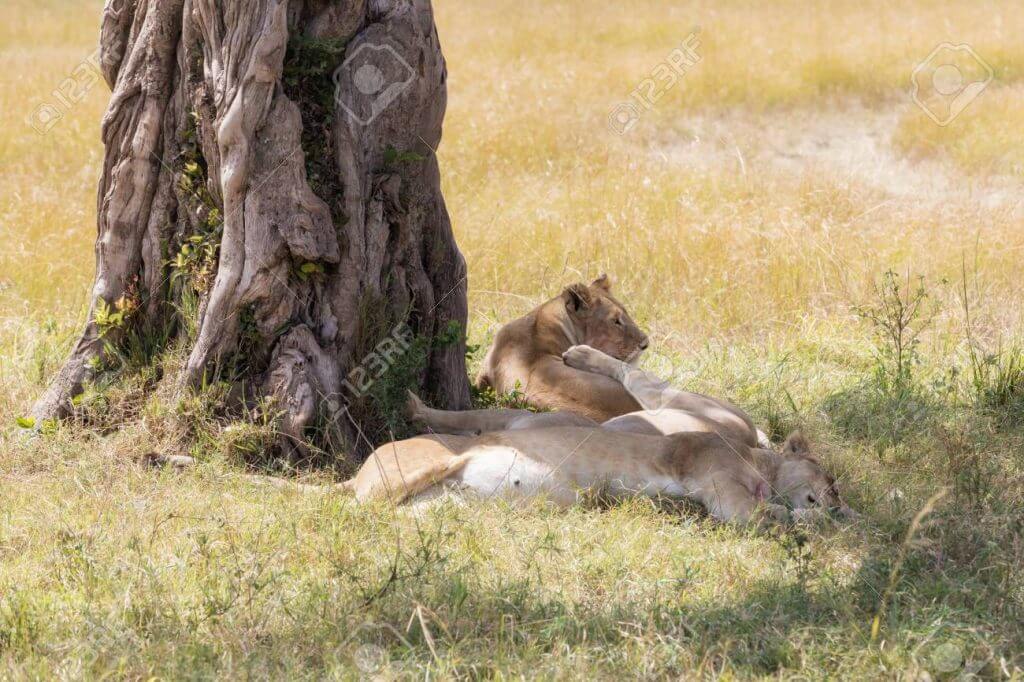If you don’t adapt to the shape of the day it makes everyday life and work a struggle. Looking at ways we will do things differently.

I currently live in a lovely loft apartment in London, flooded with natural light all day. A great place to work, except on the rare occasions when the temperatures in summer creep up to or over 30c. When that happens, my computer literally overheats when I try to run video calls, so, whenever I can, I simply block out the diary for two hours in the hottest part of the afternoon.
What? You take time off in the middle of the day? How strange!
Well, not if you are Spanish and are used to the idea of siesta, or from anywhere in the world where it is really hot and there is no air conditioning (or simply that the culture remembers a time before it existed), or even these three lionesses conserving energy in the shade.
“Innovation is simply doing things differently and doing different things” is my definition of the “I” word.
Adapting to the days, the seasons, to different constraints (such as on-again, off-again Covid-19 constraints), these are among the themes in the latest blog from the “master of pause”, Rob Poynton, in which he muses on the idea of “adapt to the shape of the day”, looking at ways we will do things differently and do different things.
Rob is my next guest on WhatComesNext.Live, join us live at 17:00 UK time on Tuesday 21st July, or simply catch up with the show on YouTube or your favourite podcast source at anytime.
Over to you, Rob:
Everything all the time
by Rob Poynton, July 15, 2020
“In my lifetime, it has always just been assumed that, if you have the means, you can have everything you want, all the time. I am not sure that is possible any more. As a society we are going to have to choose. Perhaps the pubs will open one week, and the cinemas the next, but not both at the same time?”
I was talking with Mike Large of Real World Records, who was reflecting on the future of the cultural sector in general, and festivals in particular, in a time of pandemics.
I was struck by how powerful such a simple thought was. Amidst all the talk of a ‘new normal’ here was a revolutionary, yet incredibly simple idea: maybe you can’t have everything all the time. Woa.
The suggestion of restriction or limitation immediately conjured up images of wartime rationing, the hardship of a bygone age, or a country struggling to emerge from poverty. It jarred with my assumptions about what it means to live in a modern, affluent, ‘open’, democratic society (and thus made those assumptions visible – a necessary step in being able to question them). It felt like heresy, which shows how deeply I hold such beliefs.
The idea of pubs and cinemas alternating got me thinking about how we expect to be able to buy, or watch, or do anything we want to, whenever we want. We presume people (ourselves included) will be available all the time, at the drop of a hat. We are, or aspire to be ‘always on’. This is an undifferentiated, relentless, industrial version of time.
In the organic world (of which we are part) time is not like that. It varies. Take today for example. Here in the Sierra de Gredos, in July, the early morning is calm, quiet and (relatively) cool. So I started working on this piece at 7am when the temperature was only about 20°C. If I want to get anything done I have to get up early, because by 3pm it will be a paralysing, brain-melting 38°C and the insect life will enter a ‘frenesí’ (from which the English word ‘frenzy’ comes).
That may be lovely if you are on holiday, but if you don’t adapt to the shape of the day it makes everyday life and work a struggle. By 10pm, as the heat subsides and the night comes on, it is still deliciously warm, which is why the local cultural response to eat late and spend time outside deep into the night makes such sense. Each hour, in each place, has its own character.
As do the seasons of the year. A time to sow and a time to reap (strawberries in June, oranges and olives in December). The promise of a good harvest often lies in a mid-winter cold snap, fierce enough to kill off pests and plagues before they get going in the spring. The practice of regenerative agriculture revives the idea of leaving fields to lie fallow, every few years. Variety and contrast matter.
Can we allow ourselves to lie fallow, I wonder? As I explored in ‘Do Pause‘ – can we design, creatively, a variegated, rhythmic pattern that ebbs and flows across our hours, days and years? Could we embrace the idea of not having everything all the time as a gain not a loss, as a liberation, freeing ourselves up from constant, nagging, repetitive activity?
The economy and the technology that drives it promised us abundance – everything we could possibly want whenever we want it. But as part of the same bargain it has given us scarcity – of time and attention.
Just yesterday my wife Bea was describing how in the summers of her childhood, her grandmother would spend the afternoons playing solitaire (with cards!) whilst listening to classical music, a whisky at her elbow. Who would do that today? And yet, I imagine most of us would regard that as a luxury.
Perhaps the (taboo) idea of restrictions and limitations might not be a step backwards, but an advance, ushering in a different understanding of abundance, which is less about having everything all the time, and more about having each thing in its own time.
